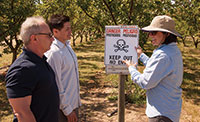2014 Highlights: UC IPM Annual Report
New pesticide safety training regulations

Lisa Blecker leads Train-the-Trainer programs on pesticide safety. (Photo by F. Martino)
IN BRIEF
- Stronger worker protections include improved trainer qualifications, and more frequent and detailed training.
- Hands-on activities will improve the training provided to fieldworkers and pesticide handlers.
- Improved trainings will enable workers to protect themselves, leading to increased safety on the job.
Federal and state regulatory agencies are proposing stronger protections for fieldworkers and pesticide handlers under the worker protection standard. These agencies have identified the need for improved trainer qualifications, and more frequent and detailed training. Their likely response will be to support improved training for trainers, require annual fieldworker training, and expand the training to include topics such as how to reduce take-home exposure to pesticides.
UC IPM’s successful Train-the-Trainer program, led by Pesticide Safety Education Program Coordinator Lisa Blecker, qualifies people to train fieldworkers and pesticide handlers on issues of pesticide safety. In these programs participant trainers learn the basic concepts they must cover in their pesticide safety trainings, and are encouraged to use hands-on techniques. In collaboration with the California Department of Pesticide Regulation, Blecker will expand this offering by developing hands-on modules in which trainers will be instructed on hands-on techniques aimed at improving training provided to fieldworkers and pesticide handlers. Blecker will be working closely with various county agricultural commissioners, labor contractors, trainers, and farmers across the state of California to improve trainer qualifications and the quality and effectiveness of the trainings. This program is the first of its kind to be implemented and coordinated among key stakeholders.
By adding the hands-on component to the basic Train-the-Trainer program, we expect to improve the knowledge and qualifications of pesticide safety trainers. By giving these trainers more information and tools, we can increase the practical pesticide safety knowledge of fieldworkers and pesticide handlers. They will better understand the risks and how to protect themselves. This will lead to fewer pesticide exposures and more people safe at work.
|

